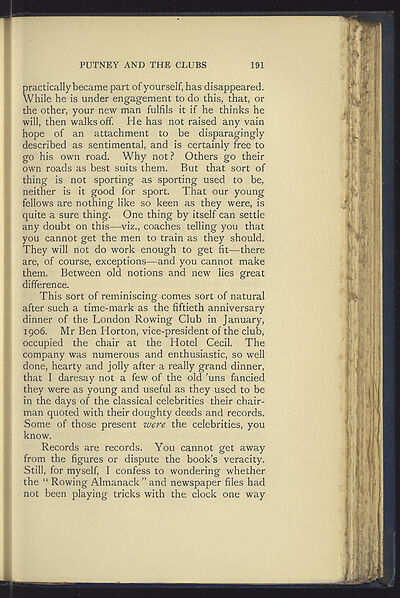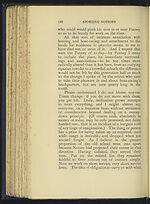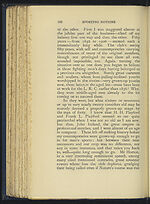Download files
Complete book:
Individual page:
Thumbnail gallery: Grid view | List view

PUTNEY AND THE CLUBS 191
practically became part of yourself, has disappeared.
While he is under engagement to do this, that, or
the other, your new man fulfils it if he thinks he
will, then walks off. He has not raised any vain
hope of an attachment to be disparagingly
described as sentimental, and is certainly free to
go his own road. Why not? Others go their
own roads as best suits them. But that sort of
thing is not sporting as sporting used to be,
neither is it good for sport. That our young
fellows are nothing like so keen as they were, is
quite a sure thing. One thing by itself can settle
any doubt on this—viz., coaches telling you that
you cannot get the men to train as they should.
They will not do work enough to get fit—there
are, of course, exceptions—and you cannot make
them. Between old notions and new lies great
difference.
This sort of reminiscing comes sort of natural
after such a time-mark as the fiftieth anniversary
dinner of the London Rowing Club in January,
1906. Mr Ben Horton, vice-president of the club,
occupied the chair at the Hotel Cecil. The
company was numerous and enthusiastic, so well
done, hearty and jolly after a really grand dinner,
that I daresay not a few of the old 'uns fancied
they were as young and useful as they used to be
in the days of the classical celebrities their chair-
man quoted with their doughty deeds and records.
Some of those present
were
the celebrities, you
know.
Records are records. You cannot get away
from the figures or dispute the book's veracity.
Still, for myself, I confess to wondering whether
the " Rowing Almanack " and newspaper files had
not been playing tricks with the clock one way
i
a
4
w
:Y
i
,.
1
practically became part of yourself, has disappeared.
While he is under engagement to do this, that, or
the other, your new man fulfils it if he thinks he
will, then walks off. He has not raised any vain
hope of an attachment to be disparagingly
described as sentimental, and is certainly free to
go his own road. Why not? Others go their
own roads as best suits them. But that sort of
thing is not sporting as sporting used to be,
neither is it good for sport. That our young
fellows are nothing like so keen as they were, is
quite a sure thing. One thing by itself can settle
any doubt on this—viz., coaches telling you that
you cannot get the men to train as they should.
They will not do work enough to get fit—there
are, of course, exceptions—and you cannot make
them. Between old notions and new lies great
difference.
This sort of reminiscing comes sort of natural
after such a time-mark as the fiftieth anniversary
dinner of the London Rowing Club in January,
1906. Mr Ben Horton, vice-president of the club,
occupied the chair at the Hotel Cecil. The
company was numerous and enthusiastic, so well
done, hearty and jolly after a really grand dinner,
that I daresay not a few of the old 'uns fancied
they were as young and useful as they used to be
in the days of the classical celebrities their chair-
man quoted with their doughty deeds and records.
Some of those present
were
the celebrities, you
know.
Records are records. You cannot get away
from the figures or dispute the book's veracity.
Still, for myself, I confess to wondering whether
the " Rowing Almanack " and newspaper files had
not been playing tricks with the clock one way
i
a
4
w
:Y
i
,.
1
Set display mode to:
![]() Universal Viewer |
Universal Viewer | ![]() Mirador |
Large image | Transcription
Mirador |
Large image | Transcription
Images and transcriptions on this page, including medium image downloads, may be used under the Creative Commons Attribution 4.0 International Licence unless otherwise stated. ![]()
| Sports publications > Sporting notions of present days and past > (203) |
|---|
| Permanent URL | https://digital.nls.uk/231785341 |
|---|
| Description | More than 230 sports publications from the National Library of Scotland's collections. Featured sports include football, rugby, golf, shinty, athletics, bowls, cricket and hockey. Among the material from the late 19th and early 20th centuries are match programmes, club histories, and handbooks. From the late 20th century are promotional materials to encourage greater diversity in sport. Most items cover sports activities in Scotland. There are also publications relating to the Olympics and international matches. |
|---|---|
| Additional NLS resources: |
|

